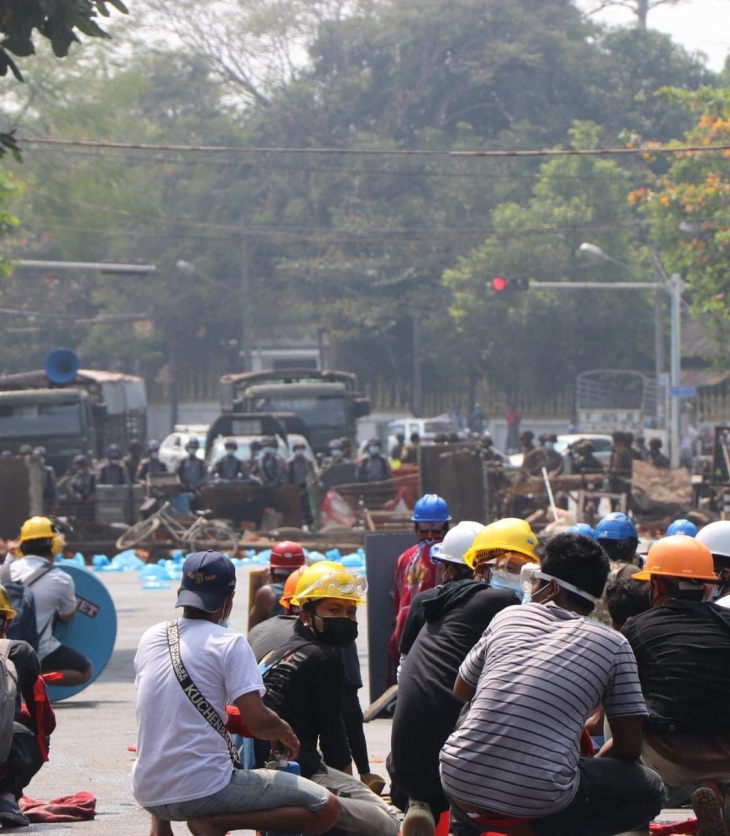Bella Aung calls for recognizing minorities’ contributions to ongoing anti-coup protests.

On the cozy morning of Sunday, January 31, I was discussing Burmese politics with a dear one over breakfast. I unsuspectingly and nonchalantly said, “I think there will be a coup some time.” When, within the next 24 hours, the coup happened, I was taken aback by how fast it came but not surprised at all by its occurrence. Maybe my indigenous Karen-Mon ancestry combined with a childhood under Than Shwe’s military junta conditioned me to believe that the Tatmadaw will always be evil.
When Aung San Suu Kyi’s government finally took over in 2015, I was already part of the Burmese diaspora in North America. Yet, I celebrated along with those within the country, hoping for a better quality of life for historically oppressed populations. My celebration did not last long. Very soon, I realized that civil wars were still happening, countless internally displaced people (IDPs) were still suffering, and the military’s genocide of the Rohingyas was defended by Suu Kyi herself at the International Court of Justice. Despite all this and Suu Kyi’s subsequent fall from grace internationally, her NLD party won a landslide victory again in the 2020 general elections.
I would first like to acknowledge that ethnic and religious minorities were slightly better off under the NLD government compared to the previous juntas. There is no doubt that these communities are already much worse off under Min Aung Hlaing’s reign of terror. But will it be enough for minorities to just go back to an NLD regime?
The answer is a resounding no.
Why? Because indigenous activists have been at the forefront of many mass protests against the current military coup in Myanmar. Despite their intergenerational trauma resulting from countless conflicts instigated by the Tatmadaw in the Ethnic States, indigenous IDPs are bravely standing against the military junta. Many Bamar people have been negligent about the massacre of ethnic and religious minorities by the Tatmadaw until now, yet armed forces who were once called “rebels” by the Bamar are looking out for the safety of civilians protesting against the junta.
One of the first mass protests against the military coup in Yangon this month was led by two young women dressed in traditional Karen regalia, in recognition of Myanmar’s diversity, and in solidarity with the country’s minorities. Photos of an elderly Muslim man jumping in front of the youth protestors to protect them when rubber bullets were fired made rounds on social media. Rohingyas both inside and outside the country gave three-finger salutes – a gesture now synonymous with dissent against the military coup. Protests in the Ethnic States are met with violence from the police and the military but remain severely underreported compared to those in Bamar-dominant urban areas. Yet indigenous people there are continuing their fight against the junta.
All these actions take an enormous amount of resilience. More importantly, they also take love for the shared homeland, Myanmar, a love so deep and so courageous that it overcomes almost a century of nationalist oppression and marginalization – whether intentional or unintentional – by the Bamar majority. Min Aung Hlaing’s junta is not capable of this love in any capacity. Suu Kyi’s NLD sometimes attempts inclusion but often falls short of creating it. The demands of ethnic and religious minorities in this fight against the junta are simple – rather than a return to civilian government, we long for a true federal democracy; A Myanmar where our cultures and traditions would not be erased by systemic Burmanization, where our children would not have to grow up in IDP and refugee camps because of violent ethnic conflicts, and where our women could exist without having to fear the Tatmadaw’s soldiers inflicting rape as a weapon of war.
Only minorities who have actively chosen to prioritize the true freedom of Myanmar over their intergenerational trauma know how to build this new Myanmar, a country they have always envisioned out of love since the Panglong Agreement. It is now time for the Bamar majority to join forces with these minorities and fight for a truly inclusive and free country that everyone deserves. A return to the comfort zone is not enough.
Bella Aung is a Ph.D. student in Political Studies at Queen’s University, researching the political representation of indigenous women in Myanmar.
Like This Article
December 18, 2024
September 16, 2024
June 18, 2024

Center for Southeast Asian Studies, Asian Institute 1 Devonshire Place Toronto, Ontario, M5S 3K7, Canada
©TeaCircle All Rights Reserved 2023